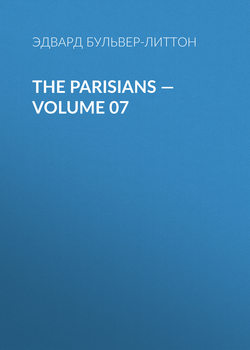Читать книгу The Parisians — Volume 07 - Эдвард Джордж Бульвер-Литтон, Эдвард Бульвер-Литтон - Страница 2
BOOK VII CHAPTER II
ОглавлениеOn leaving De Mauleon and regaining his coupe, Rameau felt at once bewildered and humbled, for he was not prepared for the tone of careless superiority which the Vicomte assumed over him. He had expected to be much complimented, and he comprehended vaguely that he had been somewhat snubbed. He was not only irritated—he was bewildered; for De Mauleon's political disquisitions did not leave any clear or definite idea on his mind as to the principles which as editor of the Sens Commun he was to see adequately represented and carried out. In truth, Rameau was one of those numerous Parisian politicians who have read little and reflected less on the government of men and States. Envy is said by a great French writer to be the vice of Democracies. Envy certainly had made Rameau a democrat. He could talk and write glibly enough upon the themes of equality and fraternity, and was so far an ultra-democrat that he thought moderation the sign of a mediocre understanding.
De Mauleon's talk, therefore, terribly perplexed him. It was unlike anything he had heard before. Its revolutionary professions, accompanied with so much scorn for the multitude, and the things the multitude desired, were Greek to him. He was not shocked by the cynicism which placed wisdom in using the passions of mankind as tools for the interests of an individual; but he did not understand the frankness of its avowal.
Nevertheless the man had dominated over and subdued him. He recognized the power of his contributor without clearly analysing its nature— a power made up of large experience of life, of cold examination of doctrines that heated others—of patrician calm—of intellectual sneer— of collected confidence in self.
Besides, Rameau felt, with a nervous misgiving, that in this man, who so boldly proclaimed his contempt for the instruments he used, he had found a master. De Mauleon, then, was sole proprietor of the journal from which Rameau drew his resources; might at any time dismiss him; might at any time involve the journal in penalties which, even if Rameau could escape in his official capacity as editor, still might stop the Sens Commun, and with it Rameau's luxurious subsistence.
Altogether the visit to De Mauleon had been anything but a pleasant one. He sought, as the carriage rolled on, to turn his thoughts to more agreeable subjects, and the image of Isaura rose before him. To do him justice he had learned to love this girl as well as his nature would permit: he loved her with the whole strength of his imagination, and though his heart was somewhat cold, his imagination was very ardent. He loved her also with the whole strength of his vanity, and vanity was even a more preponderant organ of his system than imagination. To carry off as his prize one who had already achieved celebrity, whose beauty and fascination of manner were yet more acknowledged than her genius, would certainly be a glorious triumph.
Every Parisian of Rameau's stamp looks forward in marriage to a brilliant salon. What salon more brilliant than that which he and Isaura united could command? He had long conquered his early impulse of envy at Isaura's success,—in fact that success had become associated with his own, and had contributed greatly to his enrichment. So that to other motives of love he might add the prudential one of interest. Rameau well knew that his own vein of composition, however lauded by the cliques, and however unrivalled in his own eyes, was not one that brings much profit in the market. He compared himself to those poets who are too far in advance of their time to be quite as sure of bread and cheese as they are of immortal fame.
